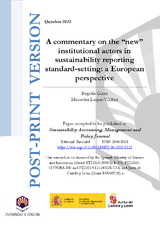Mostrar el registro sencillo del ítem
A commentary on the “new” institutional actors in sustainability reporting standard-setting: a European perspective
| dc.contributor.author | Giner, Begoña | |
| dc.contributor.author | Luque Vílchez, Mercedes | |
| dc.date.accessioned | 2024-03-18T12:21:16Z | |
| dc.date.available | 2024-03-18T12:21:16Z | |
| dc.date.issued | 2022 | |
| dc.identifier.issn | 2040-8021 | |
| dc.identifier.uri | http://hdl.handle.net/10396/27699 | |
| dc.description.abstract | Purpose – The purpose of this paper is to discuss the progress and future prospects of two relatively “new” institutions in this field: the European Commission (EC), together with the European Financial Reporting Advisory Group (EFRAG), and the International Financial Reporting Standards (IFRS) Foundation. Design/methodology/approach – This paper reflexively analyses the recent events that characterize the European Union (EU) regulatory standard-setting landscape in the sustainability field. It is mainly based on publicly available documents. Findings – After analysing the different routes followed to enter the field, this paper shows how the EC/EFRAG takes a wider view than the IFRS Foundation on certain key reporting aspects, that is, target audience, materiality and reporting boundary. As for the reporting scope, although it seems that the IFRS Foundation has a more restrictive vision, it is working to broaden it. Practical implications – This paper provides some ideas about the potential cooperation between the two institutions. This paper also highlights some potential problems stemming not only from their intrinsic characteristics but also from the routes they have taken to enter the field. Social implications – By envisioning how the EU sustainability reporting standard-setting landscape might evolve, this paper sheds light on how companies might need to approach sustainability reporting to adapt to the new institutional demands. Suggestions for collaboration between the two institutions could help them reach common ground and, thus, prevent misunderstandings for companies and stakeholders. Originality/value – The reflections and takeaways benefit from the authors’ first-hand information, as both are involved in the EU process. The authors could, therefore, feed into further discussions on the developments and challenges facing the EU in this domain. | es_ES |
| dc.format.mimetype | application/pdf | es_ES |
| dc.language.iso | eng | es_ES |
| dc.publisher | Emerald | es_ES |
| dc.rights | https://creativecommons.org/licenses/by-nc-nd/4.0/ | es_ES |
| dc.source | Giner, B., & Luque-Vílchez, M. (2022). A commentary on the “new” institutional actors in sustainability reporting standard-setting: a European perspective. Sustainability Accounting, Management and Policy Journal, 13(6), 1284-1309. https://doi.org/10.1108/SAMPJ-06-2021-0222 | es_ES |
| dc.subject | Sustainability reporting | es_ES |
| dc.subject | Proposals | es_ES |
| dc.subject | Standard-setting process | es_ES |
| dc.subject | EC | es_ES |
| dc.subject | EFRAG | es_ES |
| dc.subject | IFRS Foundation | es_ES |
| dc.title | A commentary on the “new” institutional actors in sustainability reporting standard-setting: a European perspective | es_ES |
| dc.type | info:eu-repo/semantics/article | es_ES |
| dc.relation.publisherversion | https://doi.org/10.1108/SAMPJ-06-2021-0222 | es_ES |
| dc.relation.projectID | Gobierno de España. RTI2018-099920-B-I00 | es_ES |
| dc.relation.projectID | Gobierno de España. PID2020-117792RA-I00 | es_ES |
| dc.relation.projectID | Gobierno de España. PID2019-111143GB-C33 | es_ES |
| dc.rights.accessRights | info:eu-repo/semantics/openAccess | es_ES |

